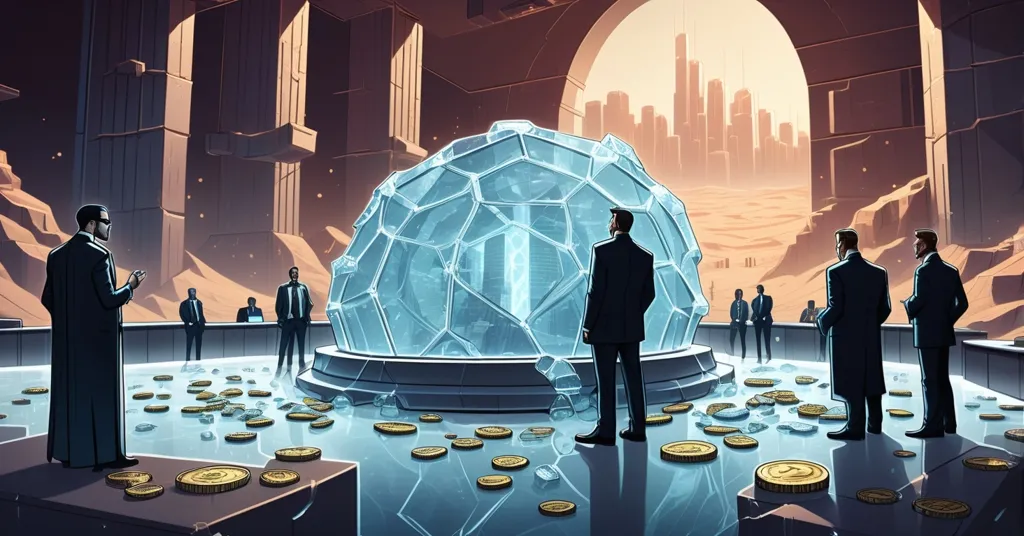Dubai Court Freezes $456M in Justin Sun’s TrueUSD Bailout Over Fraud Allegations

Dubai Court Freezes $456M in Justin Sun’s TrueUSD Bailout Amid Explosive Fraud Claims
Dubai’s Digital Economy Court has dropped a bombshell, ordering a worldwide freeze on $456 million tied to Justin Sun’s bailout of Techteryx, the issuer of the TrueUSD stablecoin. This drastic move, meant to stop the funds from slipping into the shadows, lays bare the messy underbelly of crypto finance and the fierce legal battles brewing over trust and transparency in the industry.
- Huge Freeze: $456 million linked to Justin Sun and TrueUSD locked down by Dubai court.
- Fraud Allegations: Techteryx claims misappropriation and conspiracy in Hong Kong legal fight.
- Transparency Crisis: Dodgy documentation and murky transfers spark serious distrust.
The Freeze: Why $456M Is on Ice
On December 19, 2023, Techteryx hauled several entities into a Hong Kong courtroom, alleging the fraudulent misappropriation of $456 million through six suspicious remittances. The accused include First Digital Trust Limited (FDT), Finaport Pte Ltd, Aria Fund, and Aria DMCC, with Techteryx pointing to a tangled web of conspiracy involving shady connections to Crossbridge and Legacy Trust. Payments supposedly destined for Aria Fund were instead funneled to Aria DMCC under circumstances so sketchy they’d make a scam token look legit. Dubai’s Digital Economy Court, led by Justice Michael Black, intervened with a global freeze on the funds to ensure they stay put while ownership is hashed out. Justice Black pulled no punches, highlighting glaring inconsistencies in payment records and slamming Aria DMCC for failing to explain where the money went or what assets, if any, were acquired with it. This isn’t a mere warning shot—it’s a clear message that even crypto’s borderless realm can’t dodge accountability.
“The power to make a freeze order in relation to an anticipated judgment of a foreign court is within the inherent power of the Supreme Court.” – Justice Michael Black
The freeze is a protective shield, ensuring the funds aren’t spirited away while the Hong Kong proceedings unfold. It’s a stark reminder that the long arm of the law can reach into the decentralized wild west when the stench of wrongdoing gets too strong.
TrueUSD’s Troubles: A Stablecoin in Hot Water
For those just dipping their toes into crypto, let’s break down TrueUSD. It’s a stablecoin—a type of digital currency designed to mirror the value of a fiat currency like the US dollar at a 1:1 ratio, backed by reserves of real-world assets. Picture it as a digital version of a dollar bill, meant to offer stability amid crypto’s rollercoaster price swings. But the catch? If the reserves or the people managing them are shaky, that stability can vanish faster than a rug-pulled meme coin. Techteryx, the company behind TrueUSD, sought a $456 million lifeline from Justin Sun to keep the ship steady. Instead, they’ve capsized into a legal nightmare, with claims of funds being shuffled to dubious entities and eyebrow-raising asset stakes—like supposed interests in Tanzanian mining and coal reserves—that look like blatant attempts to stash cash beyond creditors’ reach. Techteryx isn’t mincing words, calling these justifications pure fantasy concocted to cover up damning discrepancies.
“Porting is a fiction first raised in the course of the proceedings to explain away the anomalies.” – Techteryx on the defendants’ asset transfer claims
The defendants, including Matthew Brittain, managing director of Aria DMCC and CEO of Aria Fund, argue the payments were loans from FDT to DMCC, later repaid through asset transfers and “regularized” via a so-called porting exercise. To put it simply, they claim it’s like shuffling money between accounts to balance the books—a hot potato pass to dodge accountability. Techteryx calls bullshit, and frankly, so do we. If it quacks like a duck, it’s probably not a blockchain innovation.
Justin Sun: Crypto’s Lightning Rod Strikes Again
Now, let’s zoom in on Justin Sun, the polarizing figure at the heart of this mess. As the founder of TRON—a blockchain platform that’s had its own share of drama—Sun is no stranger to controversy. Back in 2017, TRON’s initial coin offering (ICO) drew flak for overblown promises and questionable practices. More recently, in 2023, the U.S. Securities and Exchange Commission (SEC) hit him with charges of fraud and unregistered securities offerings tied to TRON tokens, allegations Sun vehemently denies. His involvement in high-profile stunts, like bidding millions for a lunch with Warren Buffett only to cancel last minute, hasn’t helped his rep as a serious player. This TrueUSD bailout was billed as a heroic rescue, but with $456 million frozen and fraud claims exploding, it’s starting to look like a catastrophic miscalculation—or something far worse. Is Sun just unlucky, or is this another page in a playbook of shady maneuvers? His track record isn’t exactly inspiring confidence, and for a stablecoin already under scrutiny, his name attached is like pouring gasoline on a dumpster fire.
Stablecoin Risks: Echoes of Tether’s Dirty Laundry
This debacle isn’t a standalone disaster—stablecoins have a history of tripping over their own reserves. Take Tether, the heavyweight in the stablecoin arena. In 2021, they settled with the New York Attorney General for $18.5 million after years of questions about whether they actually held enough cash to back their tokens. The verdict? Often, they didn’t, relying on murky loans and other assets instead of cold, hard dollars. TrueUSD’s current crisis rekindles those same fears: pull back the curtain, and will you find a vault of cash or just a house of cards? Stablecoins are pitched as safe harbors in crypto’s stormy seas, but fraud or mismanagement can sink trust faster than a hacked exchange. As Bitcoin maximalists, we can’t help but raise a skeptical brow—why cling to these fiat-pegged middlemen when Bitcoin offers a tougher, truer escape from centralized control? Sure, stablecoins serve a purpose for trading and bridging to traditional finance, but when they falter, the fallout ripples across the entire market. This case might just be the wake-up call the industry needs—or the excuse regulators have been waiting for to clamp down harder.
Dubai’s Power Play: A New Sheriff in Crypto Town
Dubai’s role in this saga deserves a spotlight. The Dubai International Financial Centre (DIFC) Court, under which the Digital Economy Court operates, is stepping up as a heavyweight in crypto disputes. Think of it as a global referee for financial showdowns, designed to enforce fair play across borders. Justice Black leaned on the DIFC’s authority under the Foreign Judgments Act to issue this freeze, making it clear that Dubai can and will back foreign rulings when the stakes are high. This isn’t a one-off—Dubai has been positioning itself as a hub for digital economy innovation, with the DIFC handling a growing number of blockchain and crypto-related cases. Recent initiatives, like sandbox programs for fintech and blockchain startups, show the emirate’s ambition to be both a playground and a courtroom for the future of finance. For a decentralized space often dodging regulation, Dubai’s emergence as an enforcer signals that the days of unchecked shenanigans might be numbered. And honestly, that’s not entirely a bad thing—freedom doesn’t mean free-for-all fraud.
Systemic Crypto Woes: A Test for Decentralization
Beyond TrueUSD, this case exposes deep cracks in the crypto foundation. The industry’s promise of decentralization and financial freedom often clashes with the ugly reality of greed, opacity, and outright scams. Stablecoins, while useful for smoothing out volatility, tie us back to the very fiat systems we’re trying to escape, and when they stumble, they drag down trust in the broader ecosystem. From a Bitcoin-first perspective, this mess strengthens the case for sticking to the original vision: a peer-to-peer currency free from centralized meddling or shady bailouts. Yet, we can’t ignore that altcoins and stablecoins like TrueUSD fill niches Bitcoin doesn’t—think instant transactions or DeFi integrations on platforms like Ethereum. The catch is ensuring those niches don’t become breeding grounds for the same old financial sins. Transparency isn’t just a nice-to-have; it’s the lifeline for an industry already battling skepticism from mainstream finance and regulators. If we’re serious about disrupting the status quo, we’ve got to root out the rot ourselves before someone else does it for us with an iron fist.
What’s Next for TrueUSD and Crypto Accountability?
As this high-stakes drama unfolds, the crypto community is left chewing on some tough questions. Will TrueUSD weather this storm, or will it join the graveyard of tokens felled by scandal? Could this freeze and the Hong Kong proceedings trigger a domino effect, with regulators worldwide tightening the screws on stablecoin oversight? And where does Justin Sun go from here—savior, scapegoat, or something shadier? One thing is certain: this isn’t just about $456 million. It’s about whether crypto can mature into a legitimate force without sacrificing the principles of decentralization and privacy that birthed it. As champions of Bitcoin and effective accelerationism, we believe in pushing the boundaries of what’s possible, but not at the expense of integrity. If blockchain is the future of money, then trust is the currency we can’t afford to devalue. Stay locked in as we track every twist in this saga—because if crypto’s taught us anything, it’s that the next bombshell is always just a block away.
Key Questions and Takeaways
- What sparked the Dubai Digital Economy Court’s freeze of $456 million tied to Justin Sun and TrueUSD?
The court stepped in due to evidence of potential breach of trust and the risk of funds being hidden, pending fraud and ownership disputes in Hong Kong. - What are Techteryx’s core accusations in the Hong Kong legal battle?
Techteryx alleges $456 million was fraudulently misappropriated by entities like FDT, Finaport, Aria Fund, and Aria DMCC through shady transfers and a possible conspiracy. - Why is Aria DMCC’s handling of the funds under such heavy scrutiny?
Inconsistent documentation and a total lack of clarity on how the money was spent or what assets were bought have ignited suspicions of misconduct or deliberate obfuscation. - How might this crisis affect trust in stablecoins like TrueUSD across the crypto market?
It amplifies fears of reserve mismanagement, potentially tanking confidence in TrueUSD and casting doubt on the reliability of stablecoins as a whole. - What does the DIFC Court’s role mean for global crypto disputes?
It cements Dubai’s position as a critical jurisdiction for enforcing cross-border crypto rulings, bringing legal accountability to a often lawless digital space. - Could this case pave the way for stricter stablecoin regulations worldwide?
Absolutely—it might be the catalyst regulators need to impose tougher rules on stablecoin transparency and reserves, reshaping how these tokens operate globally.



